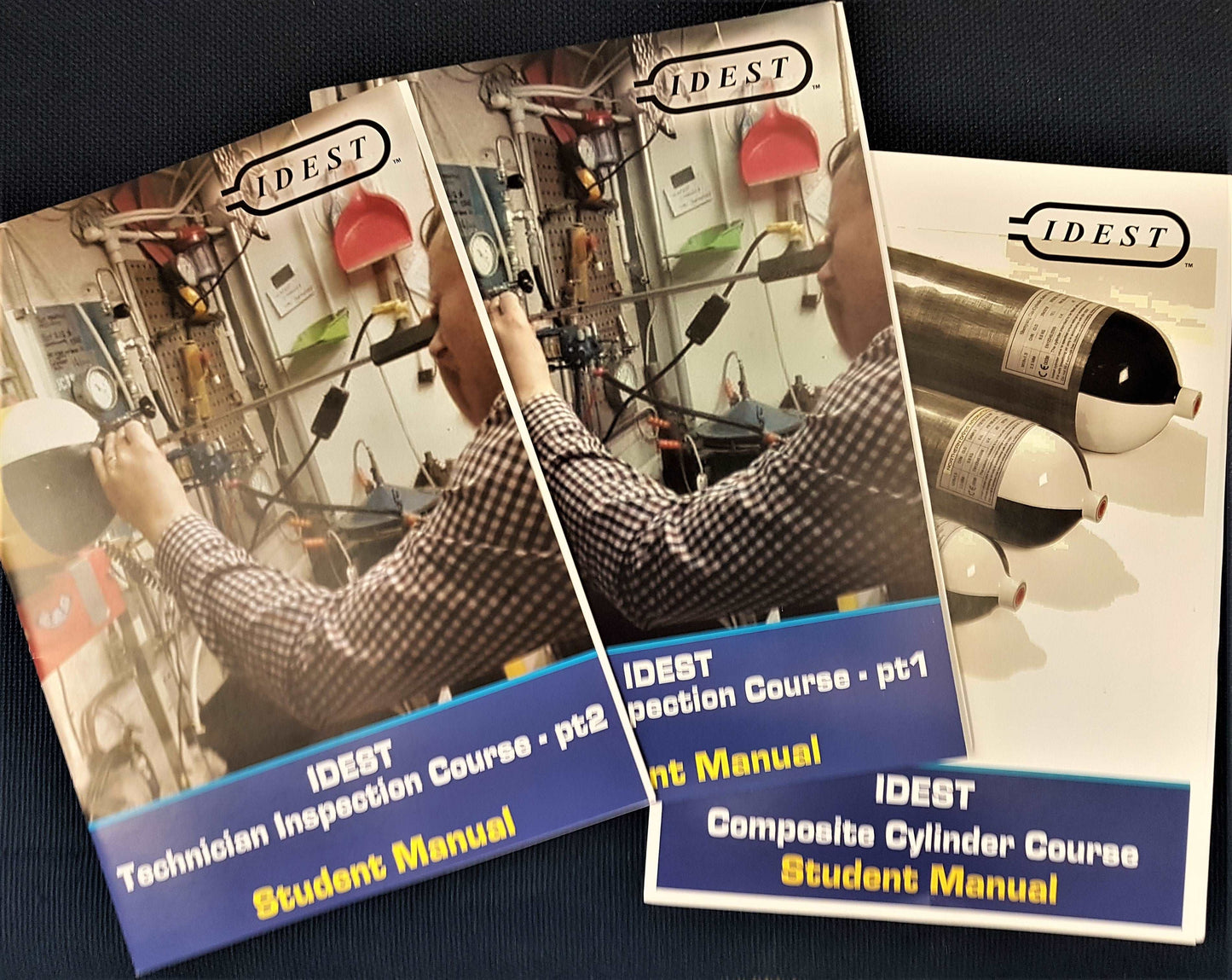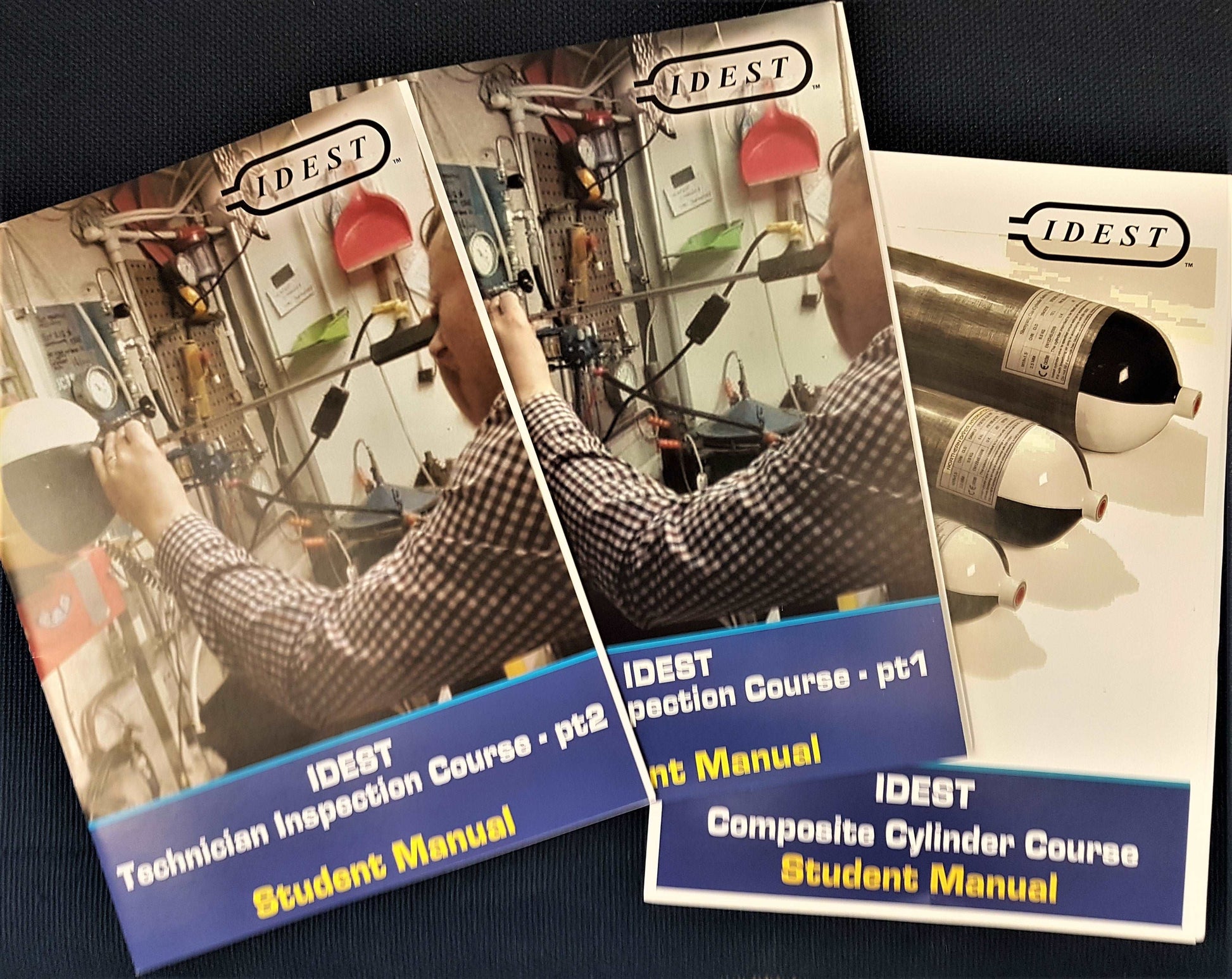IDEST
IDEST Technician Inspection Course Part 1 + 2 (TIC1/2) & Composite Cylinder Course (CCC)
IDEST Technician Inspection Course Part 1 + 2 (TIC1/2) & Composite Cylinder Course (CCC)
SKU:SSC0040
Couldn't load pickup availability
IDEST Technician Inspection Course Part 1 + 2 (TIC1/2) & Composite Cylinder Course
Aim of the course:
At the end of this course you will be able to:
• Confidently and competently visually assess diving cylinders both externally and internally
• Determine whether a cylinder can be safely filled or whether it requires a test or further action
• Satisfactorily complete the booking-in form and visual assessment form.
• Confidently and competently check cylinder and valve threads.
• Hydrostatically test a cylinder to determine its permanent set.
• Stamp and label the cylinder according to ISO standards
• Understand the construction of composite cylinders
• Confidently and competently visually assess composite cylinders both externally and internally
• Determine whether a composite cylinder requires repairing and the method to use
• Hydraulically test a composite cylinder
.• Issue test certificates for those passing the test.
IDEST Technician Inspection Course Part 1 (TIC1)
This is the first part of a two-part course aimed at technicians wanting to fully inspect cylinders in test centres. Candidates can opt to do the full course or attend Part 1 and Part 2 separately. Under the HSE’s publication Pressure System Safety Regulations 2000 it is the responsibility of the owner/employer to provide suitable training to ensure the employee is competent to safely fulfil their role.
Scope This Part 1 course is aimed at staff who wish to train as cylinder testing technicians. It covers the knowledge and practical skills needed to visually inspect a diving cylinder both externally and internally. Part 2 covers the process of physically testing the cylinder using the hydraulic test rig, stamping and issuing cylinder test certificates.
Aim of the course At the end of this short course the student will be able to: • Confidently and competently visually assess diving cylinders both externally and internally • Determine whether a cylinder can be safely filled or whether it requires a test or further action • Satisfactorily complete the booking-in form and visual assessment form.
Course Outline Course is based on a workshop format and lasts about 3 to 4 hours. It starts with a short presentation that covers the topics shown below. This is followed by a practical workshop session where cylinders are booked in and assessed for their safety. A visual assessment form is completed as the final stage of this process.
Session Topics • IDEST and the scope of its work • Cylinder manufacture • Cylinder testing methods • Cylinder stamping and labelling • Tools/equipment required for basic assessment • Checking the external condition of cylinders • Valve removal using appropriate equipment • Checking the internal condition of cylinders • Action to take in the event of concerns over condition • Forms and paperwork for assessment • Standards covering assessment and inspection
TECHNICIAN INSPECTION COURSE – Part 2
Introduction This course has been developed for IDEST Test Centre staff, who have already attended an IDEST Technician Inspection Course Part 1. The training course extends their knowledge to include methods of hydrostatically testing diving and breathing gas cylinders.
Scope
The course is for technicians, who want to provide a cylinder testing service to their customers. The course content will provide them with sufficient knowledge and practical skills to test cylinders. This is covered by BS EN 1968:2002 and BS EN 1902:2002 - Inspection and testing of cylinders
Aim of the course At the end of this short course the student will be able to:
• Confidently and competently check cylinder and valve threads.
• Hydrostatically test a cylinder to determine its permanent set.
• Stamp and label the cylinder according to ISO standards
. • Issue test certificates for those passing the test.
Course Outline
Course is based on a classroom and workshop format and lasts about 5 to 6 hours. It starts with a short presentation that covers the topics shown below. This is followed by a practical workshop session where cylinders are disassembled, hydrostatically tested, dried, reassembled, stamped and labelled according to ISO 13769:2002
Session topics
• Cylinder testing methods (various methods)
• Tools/equipment required for hydraulic testing
• Checking system is working satisfactorily - Action to take if problems occur
• Preparation of cylinder in test chamber
• Checking system is pressure tight
• The hydraulic test procedure
• Readings needed and working out results
• Removal of cylinder from chamber
• Methods of drying cylinder - Post drying internal inspection
• Valve replacement and correct torqueing
• Cylinder stamping and labelling
• Completion of documentation
Composite Cylinder Course (CCC)
Introduction
This course has been developed as a result of requests from Test Centres for further training. Centres are being approached by industry to extend the type of cylinders that they are able to inspect and test.
Scope
The course is aimed at IDEST test centre staff, who are already qualified as test centre technicians; able to inspect and test steel and aluminium cylinders. The training provides sufficient knowledge to allow the technicians to inspect and test composite cylinders under EN ISO 11623:2002
Aim of the course
At the end of this short course the student will be able to: Understand the construction of composite cylinders Confidently and competently visually assess composite cylinders both externally and internally Determine whether a composite cylinder requires repairing and the method to use Hydraulically test a composite cylinder
Course Outline
Course is based on a workshop format and lasts about 1 to 3 hours. It starts with a short presentation that covers the topics shown below. This is followed by a practical workshop session where composite cylinders are assessed externally and repaired as necessary.
Session Topics
• Cylinder manufacture
• Composite cylinder manufacture
• Types of composite cylinders
• Inspecting & testing composite cylinders
• Inspection process
• Repairing acceptable damage
• Testing methods
• Valve inspection & refurbishment
• Replacement and torqueing of cylinder valve
• Labelling of composite cylinders
• Action in the event of concerns over condition
What will the staff receive?
• Training from a qualified, competent, IDEST approved trainer
• Advice and guidance appropriate to their role
• A certificate of course attendance
• A Student Manual as source material
For course availability Please contact us on 0191 5670147
Share


